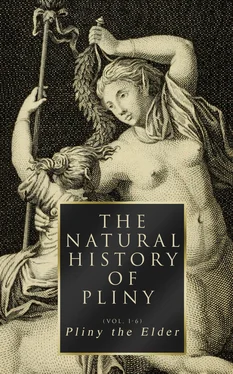Of the mode of life pursued by Pliny, and of the rest of his works, an equally interesting account has been preserved by his nephew, in an Epistle addressed to Macer 9. We cannot more appropriately conclude than by presenting this Epistle to the reader:—“I am highly gratified to find that you read the works of my uncle with such a degree of attention as to feel a desire to possess them all, and that with this view you inquire, What are their names? I will perform the duties of an index then: and not content with that, will state in what order they were written: for even that is a kind of information which is by no means undesirable to those who are devoted to literary pursuits. His first composition was a treatise ‘on the use of the Javelin by Cavalry,’ in one Book. This he composed, with equal diligence and ingenuity, while he was in command of a troop of horse. His second work was the ‘Life of Q. Pomponius Secundus,’ in two Books, a person by whom he had been particularly beloved.—These books he composed as a tribute which was justly due to the memory of his deceased friend. His next work was twenty Books on ‘the Wars in Germany,’ in which he has compiled an account of all the wars in which we have been engaged with the people of that country. This he had begun while serving in Germany, having been recommended to do so in a dream. For in his sleep he thought that the figure of Drusus Nero 10stood by him—the same Drusus, who after the most extensive conquests in that country, there met his death. Commending his memory to Pliny’s attentive care, Drusus conjured him to rescue it from the decaying effect of oblivion. Next to these came his three books entitled ‘The Student’ 11, divided, on account of their great size, into six volumes. In these he has given instructions for the training of the orator, from the cradle to his entrance on public life. In the latter years of Nero’s reign, he wrote eight books, ‘On Difficulties in the Latin Language 12;’ that being a period at which every kind of study, in any way free-spoken or even of elevated style, would have been rendered dangerous by the tyranny that was exercised. His next work was his ‘Continuation of the History of Aufidius Bassus,’ in thirty-one books; after which came his ‘Natural History,’ in thirty-seven books, a work remarkable for its comprehensiveness and erudition, and not less varied than Nature herself. You will wonder how a man so occupied with business could possibly find time to write such a number of volumes, many of them on subjects of a nature so difficult to be treated of. You will be even more astonished when you learn, that for some time he pleaded at the bar as an advocate, that he was only in his fifty-sixth year at the time of his death, and that the time that intervened was equally trenched upon and frittered away by the most weighty duties of business, and the marks of favour shewn him by princes. His genius, however, was truly quite incredible, his zeal indefatigable, and his power of application wonderful in the extreme. At the festival of the Vulcanalia 13, he began to sit up to a late hour by candle-light, not for the purpose of consulting 14the stars, but with the object of pursuing his studies; while, in the winter, he would set to work at the seventh hour of the night, or the eighth at the very latest, often indeed at the sixth 15. By nature he had the faculty of being able to fall asleep in a moment; indeed, slumber would sometimes overtake him in his studies, and then leave him just as suddenly. Before daybreak, he was in the habit of attending the Emperor Vespasian,—for he, too, was one who made an excellent use of his nights,—and then betook himself to the duties with which he was charged. On his return home, he devoted all the time which was still remaining to study. Taking an early repast, after the old fashion, light, and easy of digestion, in the summer time, if he had any leisure to spare, he would lie down in the sun-shine, while some book was read to him, he himself making notes and extracts in the meanwhile; for it was his habit never to read anything without making extracts, it being a maxim of his, that there is no book so bad but that some good may be got out of it. After thus enjoying the sunshine, he generally took a cold bath; after which he would sit down to a slight repast, and then take a short nap. On awaking, as though another day had now commenced, he would study till the hour for the evening meal, during which some book was generally read to him, he making comments on it in a cursory manner. I remember, on one occasion, a friend of his interrupting the reader, who had given the wrong pronunciation to some words, and making him go over them again. “You understood him, didn’t you?” said my uncle. “Yes,” said the other. “Why, then, did you make him go over it again? Through this interruption of yours, we have lost more than ten lines.” So thrifty a manager was he of time! In summer he rose from the evening meal by daylight; and, in winter, during the first hour of the night 16, just as though there had been some law which made it compulsory on him to do so. This is how he lived in the midst of his employments, and the bustle of the city. When in retirement in the country, the time spent in the bath was the only portion that was not allotted by him to study. When I say in the bath, I mean while he was in the water; for while his body was being scraped with the strigil and rubbed, he either had some book read to him, or else would dictate himself. While upon a journey, as though relieved from every other care, he devoted himself to study, and nothing else. By his side was his secretary, with a book and tablets; and, in the winter time, the secretary’s hands were protected by gloves, that the severity of the weather might not deprive his master for a single moment of his services. It was for this reason also that, when at Rome, he would never move about except in a litter. I remember that on one occasion he found fault with me for walking—“You might have avoided losing all those hours,” said he; for he looked upon every moment as lost which was not devoted to study. It was by means of such unremitting industry as this that he completed so many works, and left me 160 volumes of notes 17, written extremely small on both sides, which in fact renders the collection doubly voluminous. He himself used to relate, that when he was procurator in Spain, he might have parted with his common-place book to Largius Licinius for 400,000 sesterces; and at that time the collection was not so extensive as afterwards. When you come to think of how much he must have read, of how much he has written, would you not really suppose that he had never been engaged in business, and had never enjoyed the favour of princes? And yet, on the other hand, when you hear what labour he expended upon his studies, does it not almost seem that he has neither written nor read enough? For, in fact, what pursuits are those that would not have been interrupted by occupations such as his? While, again, what is there that such unremitting perseverance as his could not have effected? I am in the habit, therefore, of laughing at it when people call me a studious man,—me who, in comparison with him, am a downright idler; and yet I devote to study as much time as my public engagements on the one hand, and my duties to my friends on the other, will admit of. Who is there, then, out of all those who have devoted their whole life to literature, that ought not, when put in comparison with him, to quite blush at a life that would almost appear to have been devoted to slothfulness and inactivity? But my letter has already exceeded its proper limits, for I had originally intended to write only upon the subject as to which you made inquiry, the books of his composition that he left. I trust, however, that these particulars will prove no less pleasing to you than the writings themselves; and that they will not only induce you to peruse them, but excite you, by a feeling of generous emulation, to produce some work of a similar nature.—Farewell.”
Читать дальше












